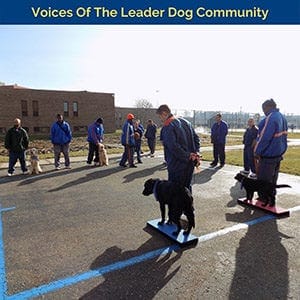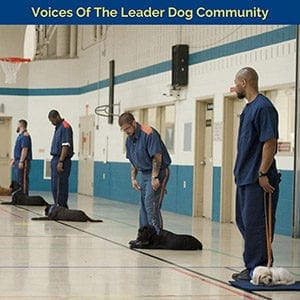Part 10: Kiki Comes Home Too!
Another unexpected blessing came our way in the form of a little black Lab named Kiki! A couple weeks after we picked up our FLD, we were offered to adopt the last puppy I raised with my partner while incarcerated! Wow! Kiki got to come home with me! How amazing is that!!!
 Sadly, she was diagnosed with stage one bilateral hip dysplasia, but so far, she doesn’t seem to notice. We get to be the happy family who takes care of her by keeping her at a healthy weight while limiting her exercise.
Sadly, she was diagnosed with stage one bilateral hip dysplasia, but so far, she doesn’t seem to notice. We get to be the happy family who takes care of her by keeping her at a healthy weight while limiting her exercise.
Keeping her exercise limited is a challenge. I’ve never seen Kiki so happy! Some puppies are born Leader Dogs and some aren’t. Kiki certainly wasn’t! She is a very energetic little girl who loves to play with her toys all day. No one is redirecting her from finding all sorts of treasures in her backyard! Kiki thinks it’s her job to pull a new stick out of the spring cleanup pile every time she is out! It’s hilarious! She plays with every stick as if it’s the only one on the planet! Every new toy she gets occupies her for hours! She spends most of her time at my mom and dad’s house after they fell in love with her – it seems that she is filling the void that was left by losing their little chocolate Lab right before I came home. Dad loves the way she swings into heel; he even began wearing a treat pouch on his hip for his new little friend! Priceless!
Reintegration with family is known to be one of the major challenges a parolee faces when venturing back out into society. Kiki has definitely helped my transition back. Often, we don’t get to hear about the roles career change puppies play in the next season of their lives. Kiki’s happily playing her role as a reintegration expert!
Part 11: Social Challenges
One of the objectives of the Voices of the Leader Dog Community outlet is to share different social perspectives. Leader Dog participants are an awesome, diverse community!
A prisoner’s social perspective is naturally different. Their experiences change their worldview. The biggest social challenge for guys still in prison is overcoming correctional employees who don’t want to see them with dogs. This attitude usually comes from misunderstanding what it is that they’re trying to accomplish for Leader Dog. Most in the “hater” category think the puppies are just pets for prisoners to enjoy instead of working dogs that will hopefully fulfill a mission. In their minds, prisoners should be habitually punished – and not have puppies.
However, there are correctional employees who love and support the program. They often face the challenge that the puppy raisers face from their troublesome coworkers too. Prison teaches us that there will always be “haters” in life. Almost any pro-social position in prison is subject to ridicule and controversy; prisoners learn to live with it. Better yet, the socially intelligent ones try to ignore and redirect the behavior so they can get positive things accomplished without the distraction!
 Since leaving prison the only social challenge I’ve experienced so far transitioning back into society was a small amount of anxiety in stores. The very first gas station we stopped at on the way home was small and packed with an overwhelming amount of stuff. Everywhere I looked, there was “stuff” all packaged in different, random and conflicting colors. I immediately thought of the old training method I read about in books called flooding. Now I personally know why flooding is a bad technique! I was flooded with an overwhelming amount of stimuli that I was not used to. The new environment blurred together, I couldn’t focus easily, and the anxiety I felt in the pit of my stomach was real.
Since leaving prison the only social challenge I’ve experienced so far transitioning back into society was a small amount of anxiety in stores. The very first gas station we stopped at on the way home was small and packed with an overwhelming amount of stuff. Everywhere I looked, there was “stuff” all packaged in different, random and conflicting colors. I immediately thought of the old training method I read about in books called flooding. Now I personally know why flooding is a bad technique! I was flooded with an overwhelming amount of stimuli that I was not used to. The new environment blurred together, I couldn’t focus easily, and the anxiety I felt in the pit of my stomach was real.
As humans we can probably externalize more than our puppies. I was able to watch the emotions that I was experiencing, whereas our puppies may not have that ability. I like to think that they do at some level (many great ethologists do too), so I was already conscious of how different environments affect them – but now I am even more aware! Forcing a puppy to learn while experiencing negative emotions would seem unproductive, and possibly even harmful. Leader Dog trained me to use distance and patience to help a puppy acclimate to a potentially stressful environment.
I can’t help but wonder if there are things that we can use as raisers to help release the anxious emotions our puppies’ experiences in their “human” worlds. Maybe by using positive associations like a toy, mat or person, we can. I personally think that anthropomorphism is a productive way to learn about out puppies – of course, we must remember that they are puppies and have different needs than humans. But becoming aware of common experiences seems to be a natural way to help us understand what’s going on inside of our little puppies!
Part 12: Forever a Puppy Raiser
Many people work in various roles to produce such wonderful working companions for people who are blind or visually impaired. As a returning citizen, I feel truly fortunate to have a role as a puppy raiser. The gratitude that I feel is common amongst the incarcerated. Raising Future Leader Dogs in prison gave my friends and I purpose. We had goals and a mission that made all the time, effort, social challenges and controversy worthwhile; challenges and controversy that I know prisoners still face while they raise their Future Leader Dogs.
A prisoner who develops a growth mindset while raising puppies becomes a product of the struggle. All puppy raisers eventually raise their frustration tolerance as a result of their commitment. A life of overcoming obstacles while staying focused on the mission creates exceptional people who will have a positive impact upon society once released. This is another, lesser-known way that Leader Dog contributes to social change.
We never know what life may bring, but my sentiment is that I will forever raise Future Leader Dogs while supporting my friends who are raising them through the struggle of incarceration. If I am able, and for as long as they will have me, these puppies will be a part of my life. There is a saying that goes something like this: “Inside of every Leader Dog beats the heart of a puppy raiser.” Prisoners put their hearts into these puppies, and then set them free.
Find out more about Troy and read part 1, part 2 and part 3 of his story. Thank you for joining us today to listen to a Voice of the Leader Dog Community!

 The benefits of prison puppy raising are huge. Beginning with hands-on instruction from my team members, I started learning about the science of behavior. I observed the handlers who were getting amazing results and mimicked them. Because I was living with so many other raisers and their puppies, I had the opportunity to learn through observation in ways that are limited in society. I also had the time to pore over the Puppy Raiser Manual and read most of the books listed in the back as recommended reading. All the effort to learn this new skill paid off in ways that eclipse the fatigue we experience as raisers. The information it takes to raise puppies has the secondary benefit of changing us – whether we realize it or not.
The benefits of prison puppy raising are huge. Beginning with hands-on instruction from my team members, I started learning about the science of behavior. I observed the handlers who were getting amazing results and mimicked them. Because I was living with so many other raisers and their puppies, I had the opportunity to learn through observation in ways that are limited in society. I also had the time to pore over the Puppy Raiser Manual and read most of the books listed in the back as recommended reading. All the effort to learn this new skill paid off in ways that eclipse the fatigue we experience as raisers. The information it takes to raise puppies has the secondary benefit of changing us – whether we realize it or not. If you’re a raiser and have the opportunity to raise many different puppies, it is possible that you will eventually get one that is so easy to raise and train that it will “ruin” the rest of your puppy raising career! I had a puppy named Zoe that raised the standard so high, now I wonder if I will ever be able to raise a great puppy again! Don’t get me wrong, all our puppies have their strengths and weaknesses, but this puppy was so easy – it was clearly her nature. She was obviously bred to be a Leader Dog! After she was just 5 months old, my partner and I got bored with her. She was ALMOST a perfect puppy!
If you’re a raiser and have the opportunity to raise many different puppies, it is possible that you will eventually get one that is so easy to raise and train that it will “ruin” the rest of your puppy raising career! I had a puppy named Zoe that raised the standard so high, now I wonder if I will ever be able to raise a great puppy again! Don’t get me wrong, all our puppies have their strengths and weaknesses, but this puppy was so easy – it was clearly her nature. She was obviously bred to be a Leader Dog! After she was just 5 months old, my partner and I got bored with her. She was ALMOST a perfect puppy! The transition back into society after 22 years of incarceration has been good. I planned to continue to do the same things that made me successful while incarcerated. I call it my “master plan” after a book I read by Chris Wilson. The book is called The Master Plan: My Journey from Life in Prison to a Life of Purpose. If you’re reading this and are interested in what modern day incarceration is like, this book paints an authentic picture. It also details how prisoners become exceptional people. Due to the problem of mass incarceration, there are a lot of us out here now. You are probably encountering ex-cons (returning citizens, as they are now calling us) every day without even knowing it. So, I was released with a list of goals in my master plan and right at the top was continuing with Leader Dog.
The transition back into society after 22 years of incarceration has been good. I planned to continue to do the same things that made me successful while incarcerated. I call it my “master plan” after a book I read by Chris Wilson. The book is called The Master Plan: My Journey from Life in Prison to a Life of Purpose. If you’re reading this and are interested in what modern day incarceration is like, this book paints an authentic picture. It also details how prisoners become exceptional people. Due to the problem of mass incarceration, there are a lot of us out here now. You are probably encountering ex-cons (returning citizens, as they are now calling us) every day without even knowing it. So, I was released with a list of goals in my master plan and right at the top was continuing with Leader Dog.